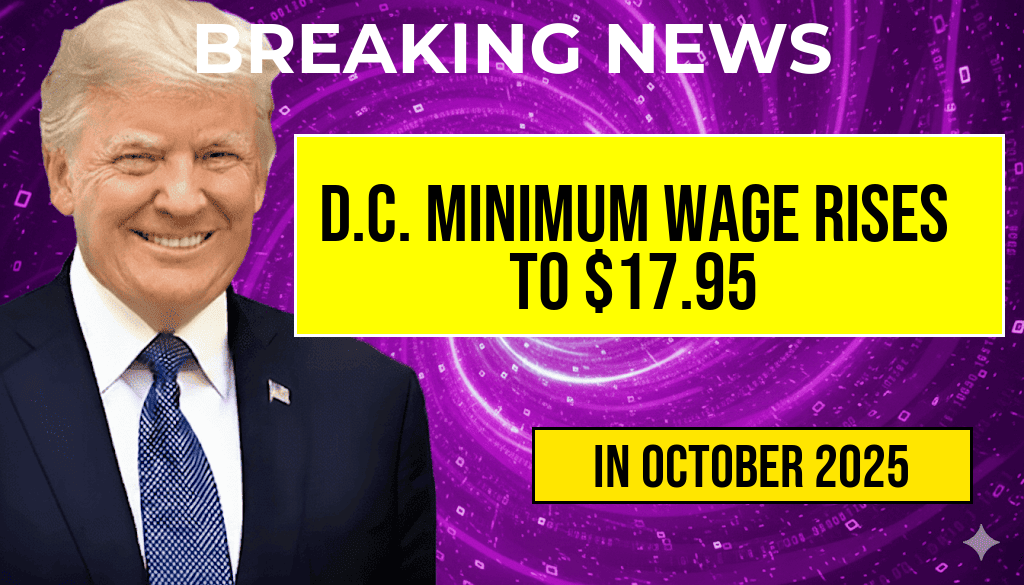Washington D.C. Increases Minimum Wage to $17.95 per Hour, Raising Earnings by 45 Cents
Effective immediately, the District of Columbia has increased its minimum wage to $17.95 an hour, marking a modest but notable boost for thousands of low-wage workers across the city. This adjustment results in an additional 45 cents per hour compared to the previous rate of $17.50, translating into an annual increase of approximately $936 for full-time employees working 40 hours a week. The change aligns with ongoing efforts by local policymakers to address income disparities and improve living standards for workers in the nation’s capital.
The wage hike, approved by the D.C. Department of Employment Services, reflects the city’s commitment to maintaining a competitive minimum wage amid rising inflation and living costs. It also follows a history of incremental increases designed to balance economic growth with worker support. With this update, D.C. continues to position itself among the states and municipalities with the highest minimum wages nationwide, underscoring its leadership in labor policy.
Context and Impact on Local Workforce
The increase affects an estimated tens of thousands of workers across various sectors, including retail, hospitality, healthcare, and public services. Many employees who earn at or near the previous minimum wage will see their paychecks grow, which could influence consumer spending and local economic activity. Employers, meanwhile, are adjusting their payrolls to accommodate the new rate, with some expressing concerns about potential impacts on staffing and costs.
According to recent data from the U.S. Bureau of Labor Statistics, D.C. has experienced a steady rise in the minimum wage over the past decade, outpacing many neighboring jurisdictions. The city’s approach reflects a broader trend among urban centers seeking to improve income levels without resorting to sweeping legislative changes that could hinder business growth.
Legal and Political Considerations
The wage adjustment is rooted in legislation passed by the D.C. Council, which mandates annual reviews of the minimum wage based on inflation indices and economic indicators. The last increase occurred in 2022, when the wage rose from $17.00 to $17.50 per hour. Advocates for higher wages argue that even incremental increases are vital for reducing poverty and supporting economic mobility, especially in a city with significant income inequality.
Opponents, often representing small business interests, caution that rising labor costs could lead to reduced hiring or increased automation. However, the district’s government emphasizes that the benefits of a higher minimum wage—such as improved quality of life and reduced reliance on social services—justify the adjustment.
Economic Projections and Broader Trends
| Previous Rate | New Rate | Hourly Increase | Annual Increase (40 hrs/week) |
|---|---|---|---|
| $17.50 | $17.95 | $0.45 | $936 |
This small but meaningful hike demonstrates how local policymakers are balancing economic growth with social equity. While some critics argue that further increases are necessary to keep pace with inflation, others highlight the importance of gradual adjustments to avoid disrupting small businesses and employment opportunities.
Research from institutions like the Wikipedia entry on minimum wage suggests that moderate increases can lead to reduced employee turnover and increased productivity, benefits that can offset higher labor costs. Meanwhile, economic analyses from Forbes point out that cities with higher minimum wages often experience better health and social outcomes among low-income populations.
Looking Ahead
As D.C. continues to adapt its minimum wage policy, discussions about future adjustments are likely to persist, especially as inflation persists and economic conditions evolve. The city’s approach serves as a benchmark for other municipalities considering similar policies, emphasizing the importance of tailored strategies that reflect local economic realities.
For workers and employers alike, the key takeaway remains clear: the minimum wage hike to $17.95 per hour signifies a step toward addressing income inequality, with tangible benefits for those earning the least in the District. As the city navigates the balance between economic vitality and social equity, ongoing monitoring and policy adjustments will be essential to sustain progress.
Frequently Asked Questions
What is the new minimum wage in D.C.?
The minimum wage in D.C. has increased to $17.95 an hour.
How much will this wage increase my annual earnings?
This increase will raise annual earnings by approximately $936.
By how much did the hourly wage increase?
The hourly wage has increased by 45 cents per hour.
When did the new minimum wage take effect?
The new minimum wage in D.C. came into effect on [Insert Effective Date].
Who is affected by the minimum wage increase?
The minimum wage increase impacts employees earning minimum wage in D.C., including workers in various sectors such as retail, hospitality, and service industries.

Leave a Reply